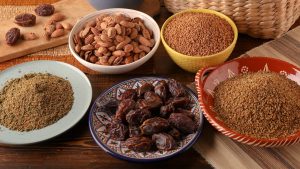I would like to discuss the culinary culture that is becoming increasingly predominant in Ramallah. I have witnessed with more and more perplexity the continuous opening (and closing) of places where food is consumed, as if it were a product of little value without consideration of the multiple layers of its intrinsic value that cannot be approached from a consumerist perspective. For one thing, more and more places serve fast food of all kinds. I never understood exactly how we can relate “fast” with food. Of course, to fill a round fluffy roll with a grilled hamburger, some vegetables, and a ready-made sauce may take only a few minutes, but let’s be honest: To breed the cow or chicken, to farm the grains and process them into flour, or to cultivate the vegetables from which the sauces are made takes time, energy, and resources! Furthermore, why are we supposed to rush ourselves while eating?
So let’s leave alone the so-called fast-food places, since no one expects them to serve deliciously savory, tasty, and nutritious food. Let us focus on the food that is offered by local cafés and, above all, restaurants as places that reflect competence and professionalism in gastronomy and culinary culture. I consider food to be an expression of the interaction between human creativity and a given environment where territorial features, resources, and weather play a role. After all, whether we live in a cold or hot climate, our surroundings require that we nourish ourselves with different types of diet to keep our body in ideal condition, and available resources vary from one territory to another.
In the globalized world we inhabit, the circulation of agri-food products and cultures increasingly affects the habits of all of us. Let’s be honest, we like to try cookies, cheeses, spices, coffee, tea, cacao and chocolates, flours, rice, and grains from all over the world.
The history of food is also a story of an exchange of knowledge that is part of human history. The similarity of names reveals that many food-related products have been circulated globally for many centuries. For example, the word “sugar” comes from the Arabic sukkar; the name mocha is from the Italian machine used to make coffee and has its origins in the port of Mocha in Yemen, from where coffee was traded to Europe, frequently via Italian seaports. Our salad, in Arabic salata, has its origins in the Roman conquest: The Roman armies use to plant small gardens around their military camps while moving from one territory to another, and “salads” can be found in all cultures that encountered the Romans, from northern Europe throughout the Middle East to North Africa. The worldwide availability of contemporary “traditional” European dishes is the historical and cultural byproduct of colonial enterprises. There would not be pizza without the tomatoes that originate from the Americas, nor French fries without the potatoes brought to Europe from the American colonies; neither would Europeans know corn, tea, coffee, or chocolate. Globalization has brought Italian, Chinese, Indian, Thai, Latin American, and similar cuisines to many Western countries, and Western/American-concept fast food is gaining popularity all over the globe.
Palestine occupies a central place in the rich Mediterranean agricultural heritage and culinary culture which is known for its wide agri-food variety with rich nutritional values. Yet it tends to be presented in standardized stereotypical and de-territorialized ways by the restaurants in town. And while not all restaurants can specialize in the delicious local Palestinian cuisine, there are other ways by which we can foster a stronger connection to our local surrounding. For example, I propose that we could and should know the origin of the products that are used to prepare the dishes on a given menu.
If we look at food from a cultural, anthropological, historical, and nutritional perspective, the culinary offers of cafés and restaurants in Ramallah have room for improvement. If we claim to care for Palestinian products and workers, we must show this in the choices we make.
A couple of years ago I was in an elegant, expensive − if money were among the criteria to evaluate quality, but I do not find it a good indicator! − prestigious, and well-known restaurant in town. The menu did not have any special dish, so I ordered an item from the kids’ menu for my child and opted for the so-called Palestinian mezze for myself, expecting a seasonal selection of fresh culinary creations prepared with care by the chef. Instead, a kind and well-trained waitress arrived with a fast-food-quality dish for kids (the waitress confirmed that the meatballs and French fries had been frozen and were fried in a common pot of vegetable oil and served with very commercial ketchup and without vegetables). The mezze was very much like the one I usually prepare at home, which was disappointing, as I had gone to a restaurant because I expected a culinary experience that reflects the professional competence and knowledge of the chef – I expected something of added value.
When I travel abroad, I tend to classify restaurants based on the criteria of hygiene – even in Ramallah, the hygienic conditions of restaurants and cafés frequently are not up to par with local laws and regulations. But I also care about the origin of the ingredients that go into the various dishes and pay attention to how the food is processed. I would like to know if the restaurant and/or its chef has purchased the vegetables, fish, and meat from specific farmers and areas of the country that are known for solid agricultural production. In other words, I care about how the dishes on local menus relate to our local environment and to the workers in the agri-food sectors. I relate these concerns to the question: What kind of a culinary culture is promoted by the professionals?

If the food on a menu is prepared by a competent, professional chef with sound culinary knowledge, I expect to find local and seasonal fresh food, dishes that include as much as possible local vegetables, fruits, meats, and fish, all interpreted with creativity and as an expression of the wide and rich Palestinian culinary heritage and expertise. I expect to be able to obtain information about which grains are used for the bread, the rice, the pasta, and any other cereals in the proposed dishes. I would like to know from where the olive oil comes and whether the chef has specific professional relations with the farmers and shepherds of the country and why. Hence, I expect to see and taste the touch of a competent chef as well as enjoy the atmosphere around me (and I would like to say here that restaurants must offer sections that are not filled with the smoke of cigarettes and aragheel, which negatively affects the sensorial experience of eating).
If a restaurant with a professional chef puts hamburgers on the menu, I expect that the bread, the meat, the vegetables, and the sauces be prepared from scratch and/or are selected by the chef from specific places (butcheries, bakeries, etc.). This way I know that this restaurant offers special and unique products that I can eat only in this particular place – otherwise, what is the difference between this and any other fast-food kind of place?
In order to support the Palestinian farmers and an environmentally responsible agri-food system, restaurants might choose products that come from eco-friendly and organic farming or are imported from such places and reflect fair-trade practices.
I invite and challenge the readers: Next time you go to a café or restaurant, ask for information about the origin of the food on your plate. The moment we dedicate to drinking a “simple” coffee or tea is a moment in which we recharge ourselves, so why shouldn’t we know what we are giving to our bodies? Being aware of our food − and therefore all culinary expressions in our globalized socio-economic and cultural world – requires that we develop a greater sense of responsibility regarding farming practices. We must make the attempt to support as much as possible local agri-food production, eco-friendly if not organic agri-food production, and fair trade-labeled products. The restaurants and cafés that I am talking about are as expensive as any other restaurants in Europe and North America that are frequented by privileged persons who have financial resources and unlimited access to food; I truly find it important that we customers be informed about the food we are served.
Federica Marri is a consultant specialized in agri-food production and gender studies. She lives with her Palestinian husband and their son in Ramallah.


